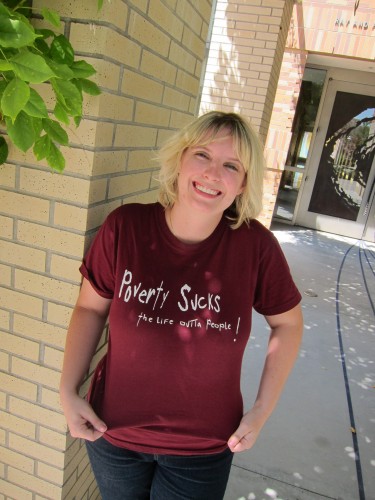
Cambria Findley-Grubb ’13 wears a shirt that she says sums up the main lesson gleaned from a summer internship.
This summer Fulbright Scholar Cambria Findley-Grubb ’13 studied the hard numbers behind poverty in America. The really hard numbers. Like how to feed a family for a week on $21 in food stamps. How long a bus transfer is valid. How precious one apple becomes when it’s the only fresh fruit you’ll eat all week.
Findley-Grubb’s one-week experience of living at the poverty level was arranged courtesy of her summer internship with Urban Spirit, a faith-based nonprofit in Louisville, Ky.
Urban Spirit
plunges people into simulations with the goal of changing participants’ assumptions about poverty and returning them to their communities with a passion for change. Church and youth groups from throughout the nation travel to Louisville for the simulations.
Of course, it was hardly the real deal. Interns are housed in a safe, air-conditioned house. Findley-Grubb got stranded on the bus system beyond the city limits and a supervisor retrieved her. She and her teammates failed at some tasks – they never found a reduced-price school uniform for a hypothetical third-grader despite hours of visiting downtown churches and social service agencies. But no one lost a day of work or missed school, as might have been the case in a real family. Still, the experience made an impression.
We caught up with Findley-Grubb recently to talk about her summer, just before she takes off on her next adventure as a
Fulbright Scholar
in Nova Scotia, Canada. She arrived intentionally wearing a T-shirt emblazoned with a message she says sums up the main lesson: “Poverty Sucks the life outta people!”
The following is an edited version of that conversation.
Q
.
We know poverty is hard and see it in our own communities. Why do we need a simulation?
A
. The reason we do a simulation is that you don’t really understand that unless you experience it. You don’t really understand the hopelessness, what it’s like to work hungry, what it’s like to try and focus and keep critical thinking skills when you’re hungry. We can tell people statistics, but they don’t really develop an understanding of that unless they are hungry or are incredibly tired.
Q
.
What grows out of that?
A
. The really cool thing is that we encourage the groups to come up with some sort of project that spreads or continues the learning they’ve started. We have youth who want to be businesspeople and maybe now they’re more committed to paying a living wage, or they’ll look for politicians they can vote for who support those ideas.
Q
.
How did your team of four feed itself on the typical food stamp allotment of $21?
A
. We were living in the west end of Louisville. It’s a food desert there in that neighborhood. It takes a mile to walk to the nearest grocery store. We pretty much bought rice, tortillas, beans, bread, peanut butter and jelly. We didn’t get any fruits or vegetables. Each of us bought one apple for the whole week. You could eat it at once, cut it up, save it for later or whatever you wanted to do with it. It was supposed to be a treat. Then we had to walk back in the Louisville weather and get back in time for work.
Q
.
What was your main takeaway from that week in particular, as well as the entire summer?
A
. It was the realization that I was shifting the question from “Why do these things happen?” to “Why do we let these things happen?” I want to create change. It’s really motivated me toward a future in public policy.
Q
.
And how was that apple when you treated yourself to it?
A.
By the end of the week I was craving fruit and vegetables. I don’t even remember fully eating it because, despite trying to savor it, I am sure I scarfed it down.
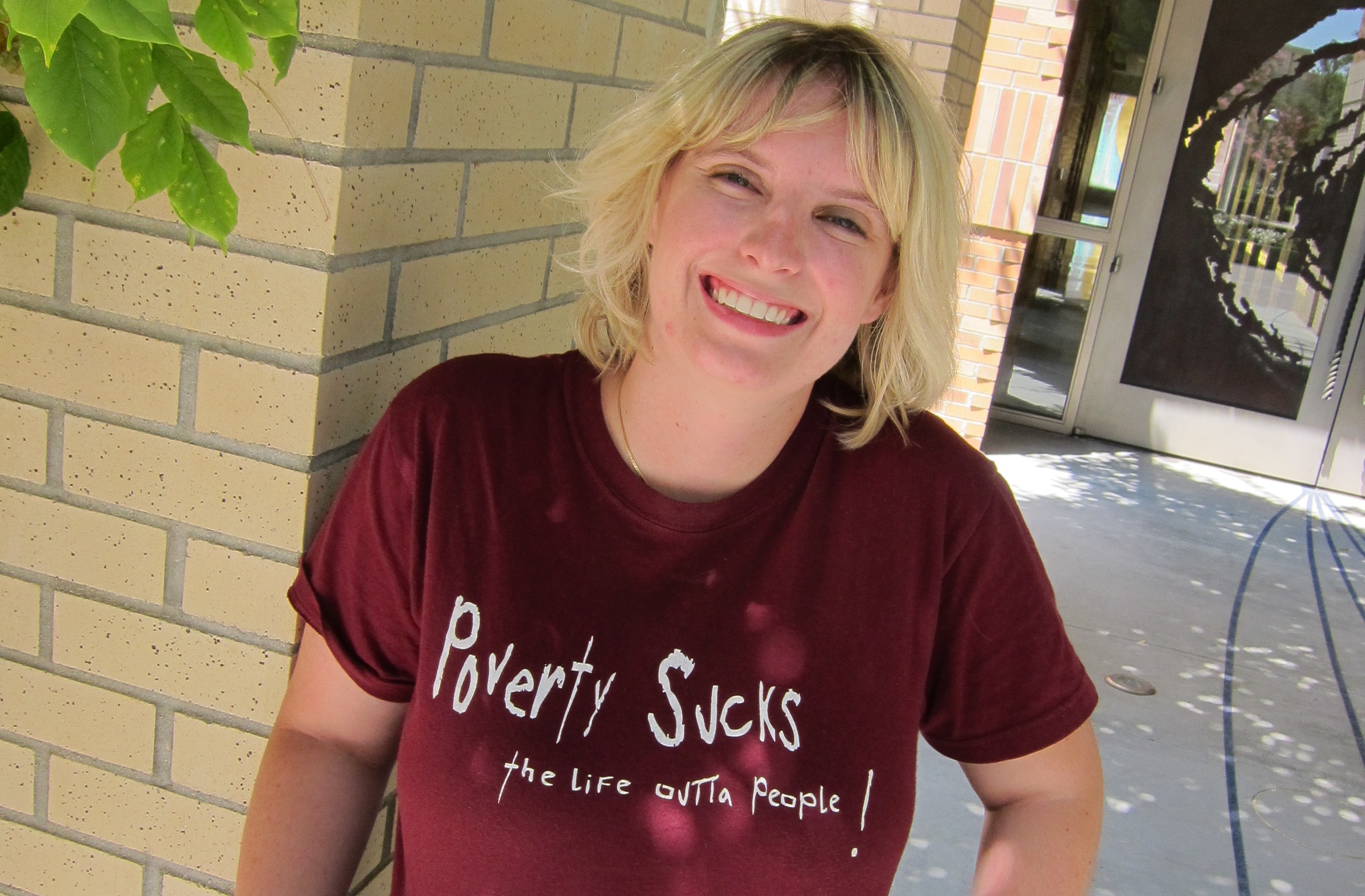
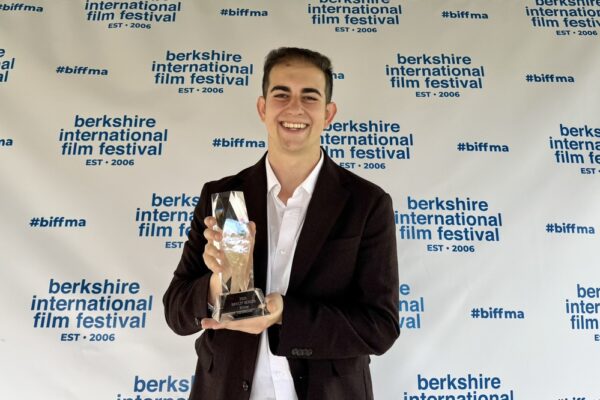
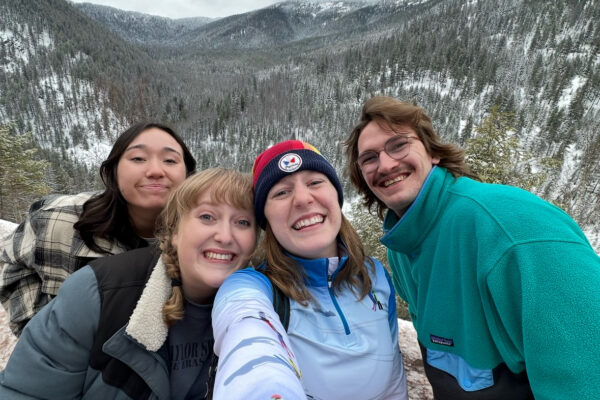
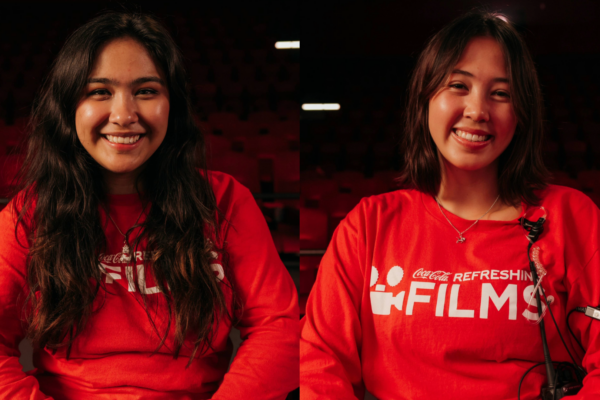

This is a great program. Disciples on Campus is proud of Cambria as she begins her Fulbright study in Nova Scotia!